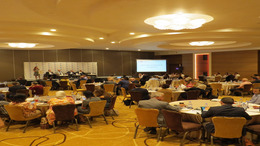The Covid-19 pandemic has sent the global economy into a tailspin. Against the background of geopolitical developments such as trade tensions between the US and China, but also in view of technological innovations, the just-in-time approach to global vertical supply chains is being questioned. Especially politicians from countries in the EU’s neighbourhood have taken up this train of thought, maintaining that the pandemic could accelerate a trend towards increased regionalisation of supply chains.
Our current Policy Brief on “Covid-19: A new era of closer cooperation between the EU and its neighbours?” analyses whether and to what degree the EU’s neighbouring countries – from Ukraine in the east to Morocco in the south – might benefit from such a trend. The point of departure is the weak integration of even the EU’s eastern member states into the value-creation process: The vast majority of value added originating from within the euro area comes from only three countries: France, Italy and Germany. The amount contributed by Europe’s neighbours is negligible.
Thus, Europe’s neighbours should by no means count on automatically benefitting from any potential regionalisation of supply chains. The reason is that, as business locations, they have numerous competitors, especially EU member states such as Poland, Romania and Bulgaria. International studies show that the eastern EU member states generally offer a more attractive investment environment than associated European neighbours. To that extent, EU membership is a competitive advantage.
Based on this analysis, the Policy Brief argues that Europe’s neighbours should increase their attractiveness to foreign investors per se. Although there are considerable differences between the neighbours, the majority would benefit from improved governance in particular. Rule of law and predictability are the basis for attracting investment. In some cases, infrastructure or skills must be improved. As for the EU, this means it should remain in dialogue with its neighbours so it can continue to demand and support better governance across projects.
The Bertelsmann Stiftung’s Europe’s Future programme brings decision makers and practitioners from three countries in the EU’s eastern neighbourhood (Georgia, Ukraine and Moldova) together with representatives from three countries in the southern neighbourhood (Morocco, Tunisia and Jordan) to exchange learning and knowledge. This network’s core topic is “Trade and Economic Integration in the EU’s Single Market”.
![[Translate to English:] International commercial port, Odessa](/fileadmin/files/_processed_/8/3/csm_1825717035shutterstock_1468999301_Premier_ST-EZ_1778e1d9a8.jpg)




![[Translate to English:] Gruppenbild mit tunesischer Delegation, den georgischen und ukrainischen Verhandlungsführerinnen Tamara Kovzeridze und Veronika Movchan sowie den Vertretern der Bertelsmann Stiftung Miriam Kosmehl und Christian-Peter Hanelt](/fileadmin/files/_processed_/0/7/csm_1920756516IMG_0123_e448663d83.jpg)



